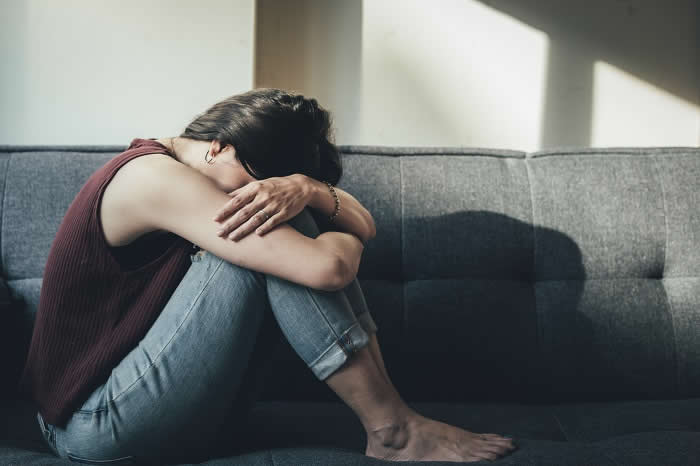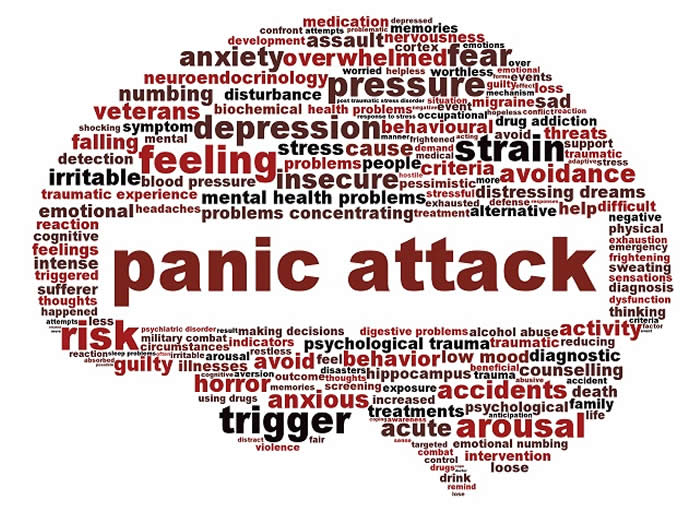Positive Health Online
Your Country

Are you Suffering from High-Functioning Anxiety
by AXA PPP healthcare(more info)
listed in anxiety, originally published in issue 256 - August 2019
Dealing with Anxiety and Panic Attacks
Anxiety and stress can affect us all in different ways - in some cases it can even begin to affect our personal life or harm productivity at work. Prevention of anxiety essentially involves an awareness of life's stresses and your own ability to cope with them.

Image Courtesy cbc.ca Radio Anxiety and Depression
There a number of tips AXA PPP healthcare can recommend for coping with anxiety:
- Write down your worries. Keep a pad and pencil on you, or type on a laptop. When you experience anxiety, write down your worries. Writing down is harder work than simply thinking them, so your negative thoughts are likely to disappear sooner;
- Create an anxiety worry period. Choose one or two 10 minute ‘worry periods’ each day, time you can devote to anxiety. During your worry period, focus only on negative, anxious thoughts without trying to correct them. The rest of the day, however, is to be designated free of anxiety. When anxious thoughts come into your head during the day, write them down and ‘postpone’ them to your worry period. This sounds crazy but I have found it really helps my patients - it gives you permission to worry;
- Accept uncertainty. Unfortunately, worrying about all the things that could go wrong doesn't make life any more predictable-it only keeps you from enjoying the good things happening in the present. Learn to accept uncertainty and not require immediate solutions;
- Try and learn about your panic. Simply knowing more about panic can go a long way towards relieving your distress. So read up on anxiety, panic disorder, and the fight-or-flight response experienced during a panic attack. You'll learn that the sensations and feelings you have when you panic are normal and that you aren't going crazy. and that the attack will not kill you;
- Avoid smoking and caffeine. Smoking and caffeine can provoke panic attacks in people who are susceptible. As a result, it's wise to avoid cigarettes, coffee, and other caffeinated beverages. Also be careful with medications that contain stimulants, such as diet pills and non-drowsy cold medications;
- Learn how to control your breathing. Hyperventilation brings on many sensations (such as light headedness and tightness of the chest) that occur during a panic attack. Deep breathing, on the other hand, can relieve the symptoms of panic. By learning to control your breathing, you develop a coping skill that you can use to calm yourself down when you begin to feel panic and finally as I have said before try and learn relaxation techniques;
- Apply some logic. If you are a very anxious person it's easy to take a single fact and build into a whole frightening scenario. As soon as you start feeling anxious about something, remember what the facts are and that you've probably worried about it a lot before, unnecessarily. If you have set this process up, what you need to do is to try to set up another process, which is more rational.

Image Courtesy Shutterstock by Andrii Kondiuk
According to the Royal College of Psychiatrists, anxiety disorders affect about one in 10 people in the UK. Here, Professor of Psychiatry at Southampton University, David Baldwin, reveals how to spot the symptoms and get treatment to prevent them.
Anxiety is the feeling of fear we get when faced with threatening or difficult situations. “Anxiety is normal and can help us to avoid danger. It makes us more alert and gives us the energy to deal with problems,” explains Professor Baldwin.
“But if the anxiety is too strong or is there all the time, it can be a real problem.”
Panic Attacks
A panic attack is a sudden surge of intense anxiety that can come from nowhere. Whilst feeling panic and anxiety is normal in stressful or dangerous situations, people who suffer from panic attacks can suffer from these feelings at any time, for no apparent reason.
“Symptoms peak within 10 minutes and usually subside after half an hour. They are not dangerous but can feel very frightening,” explains Professor Baldwin.
How Common are Panic Attacks?
“One in 10 people will have a panic attack at some point in their life, one in 20 will have recurrent attacks and one in 50 (2 per cent) will suffer from panic disorder – defined as regular, unexpected panic attacks,” says Professor Baldwin. “Symptoms usually begin before the age of 20.”
Physical Symptoms for Panic Attacks
Symptoms are experienced by the body producing the so-called ‘fight or flight’ hormone adrenaline and include:
- Heart palpitations
- Shaking
- Sweating
- Breathlessness
- Rapid breathing
- Tingling in the fingers and around the mouth
- Dry mouth
Is it a Heart Attack?
About a quarter of people who go to an emergency department with chest pain, thinking they’re having a heart attack, are actually having a panic attack. “The symptoms are easily distinguishable,” explains Professor Baldwin.
“Heart attacks are characterized by crushing central chest pain – usually on the left and also in the arm – but in a panic attack there is no pain. Heart attack symptoms will get worse but a panic attack will usually subside after half an hour.”
Psychological Symptoms of Panic Attacks
People experiencing a panic attack will feel intensely worried, agitated and fearful. They often describe feeling like they are going to die or frightened they’re 'going crazy' or losing control.
What Causes Anxiety and Panic Attacks?
No-one knows for sure – but there are certain triggers. These include:
- Your genes: Some of us are born worriers. This tendency might be inherited.
- Stressful events: Divorce, money worries, bereavement, redundancy and exams are obvious triggers for anxiety, but usually when the problem disappears, so does the anxiety. But other traumatic events such as car crashes, assaults and fires can leave you feeling nervous and anxious for months or years – known as post-traumatic stress disorder.
- Drugs: Illegal highs from amphetamines, LSD or ecstasy can make you anxious – as can excess caffeine.
Further Information
For more information on anxiety, visit AXA PPP healthcare’s health and wellbeing centre.
Comments:
-
No Article Comments available